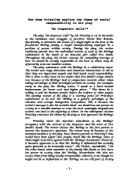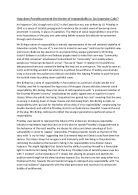In the play Priestley explores the diverse aspects of responsibility. He relates these ideas to the Birling family although the family members are stereotypes representing people at the time. Mr. Birling is ascribed very Capitalist views and believes “A man has to make his own way – has to look after himself.” These clearly contrast the views portrayed by the Inspector, Priestley’s mouthpiece in the play, which are very socialist. “We don’t live alone. We are members of one body – we are responsible for each other.” The character Mrs. Birling automatically tries to pass the blame and responsibility of the suicide of Eva Smith onto someone else, willingly creating a scapegoat, “Go and look for the father of the child, it’s his responsibility”, she tells the Inspector. Although Sheila Birling’s views are more socialist she represents the younger generation in society, she is more concerned with fashion, her appearance and family life, rather that the controversial political and social views of the time. The play as a whole is addressed to all of society and the characters are purposefully created for the audience to be able to relate to them.
There are four main roles played by the clear-thinking Inspector. As well as representing Priestley and being his mouthpiece in the play he acts as a narrator, summarising key events for the audience and as a conscience for each individual family member. He also portrays a traditional policeman of the time with a “disconcerting habit of looking hard at the person he addresses before actually speaking”. This immediately unnerves and discomfits a person. He has a very concise way of questioning and interrogating his suspects and as a policeman he is always in control, adapting the manner in which he addresses the family members to suit their personalities. He is firm and direct with Sheila, yet not too unkind. She has admitted to her involvement in the incident involving Eva Smith and has shown that she will learn from the experience. He also becomes much tougher when it is necessary. Mrs. Birling refuses to admit to her involvement in Smith’s suicide and the Inspector becomes almost aggressive in his attempt to prise the truth from her. As a dramatic devise Priestley uses the Inspector as the role of narrator and unifies the structure of the play.
There are many connotations within the name “Inspector Goole”. As an inspector he has come to investigate or inspect the family members and their actions. “Goole” is similarly sounding to the word “ghoul”, a ghost or phantom. It introduces a very eerie, morbid feel to the play as if the Inspector is not real, a ghost from the past and ever present in the lives of the Birling family.
The Inspector is a “father-confessor”, a moral force who has made the characters judge themselves. He claims to know a limited amount but expertly draws the confessions from each individual character. Throughout the play he has used relatively simplistic language, often minimal amounts, allowing the members of the family to relay their versions of events in their own time and manner. However when he states to the family, “each of you helped to kill her”, he links all of the events together, recalling each character’s involvement. His final speech dramatically contrasts his use of language throughout the play. He uses ornate, oratorical, exaggerated and hyperbolic diction in an almost biblical tone, preaching to the family and the audience. He moves from commenting on one particular person to all of those people who are cruelly and unnecessarily exploited in society, “millions of Eva Smiths and John Smiths”. This is Priestley’s main message, echoed in the character’s actions and the Inspector’s interrogation through the play; we are all responsible for each other.
Arthur Birling is head of the family, head of a firm and represents the views of Edwardian Britain. He is a traditionalist and is very pleased with himself but the character of Birling is in direct contrast to that of the Inspector. We as an audience are soon introduced to his right-wing capitalist views when he states in one of his opening speeches, “We employers are at last coming together to see that our interests…are properly protected.” Priestley’s effective use of dramatic irony also enables us to see that Birling is not as worldly-wise as he appears. Priestley’s use of hindsight allows us to view Birling as pompous, arrogant and ignorant as he puts forward views about events that are erroneous. He states that the ship Titanic is “unsinkable, absolutely unsinkable”, whereas we know that this is patently untrue. Birling is wholly concerned with protecting his reputation and his possible knighthood, “ so long as we behave ourselves, don’t get into the police court.” He believes “a man has to look after himself – and his family too”.
When the Inspector arrives and Birling learns of the suicide he is decidedly dismissive and rather impatient. His right-wing philosophy on responsibility remains unchanged throughout the entire play, “I cannot accept any responsibility”. He believes that “if we were all responsible for everything that happened to everybody we’d had anything to do with, it would be very awkward.” When he realises his son, Eric, had stolen from the company his main concern is not to help his son but to “cover this up”.
Priestley has made Mr. and Mrs. Birling the mouthpieces of all he criticises in the play. Birling’s consistency throughout the play shows that he has not and will not learn from his mistakes, or accept any responsibility for Eva Smith’s death.
Priestley hoped and believed that social change lies within the younger generations rather than the older generations and he uses the character of Sheila, representing the younger generation, to convey this idea.
We are introduced to Sheila Birling at the beginning of the play as a pretty girl in her early twenties, pleased with life and excited about her recent engagement to Gerald Croft. Priestley immediately foreshadows forth-coming events when Eric describes Sheila’s “nasty temper”. She could be viewed as very spoilt and self-centred when her involvement in Eva Smith’s death is made apparent, miss-using her status, influence and position in society to get Smith sacked from her job at Milwards. But unlike most of the other characters, with the possible exception of Eric, she soon faces up to her responsibility and feels horrendous about the whole incident, “I felt rotten about it at the time and now I feel a lot worse.”
Priestley shows a change in Sheila’s personality and morals having her evolve into a much more compassionate and serious woman by the end of the evening. She becomes involved in the death, plaguing the Inspector with questions and willingly facing up to her guilt and responsibility, “I behaved badly too. I know I did. I’m ashamed of it.” She is equally appalled by her parents’ refusal to accept responsibility and that they seem unaffected by the evening events. This is an example of the change in opinions, morals and demeanour, of which Priestley hoped we are all capable.
Although the play is reasonably short there is sufficient time for the Inspector to cause each character to state their involvement with Eva Smith and to respond to their actions. The action is continuous throughout the three acts and Priestley successfully establishes tension and suspense at the end of each act by using his use of climaxes, ensuring that the audience are left on tenterhooks at the conclusion. The two intervals are simply for the convenience of the audience and each act begins with the same scene and situation as the latter act.
The confessions made by each character are in chronological order, except at the end of the play when Mrs. Birling’s confession is presented before Eric’s. This order of events can be viewed as an increase in responsibility, which allows a progressive climatic culmination. Priestley’s two clever final twists in the plot after the Inspector departs leave the audience disconcerted and mystified. The Inspector was not real and there was no dead girl. However the telephone call at the end was genuine and this allows the audience to almost predict their own ending; how will the family react to the arrival of the real Inspector? Will they acknowledge this as a chance to admit to their mistakes or will they try and conceal their guilt?
I thoroughly enjoyed studying An Inspector Calls and have learned a great deal about how society has changed and how moral ideals have evolved over time. I found the play effective although because of the way in which society has developed Priestley’s morals may not be applicable to life today. As wealth and power have become increasingly more important socialist feelings of responsibility for one another have been progressively weakened. However I do feel that we as a society might be able to learn from some of Priestley’s teachings and work together to form a more equal society for our future generations.








